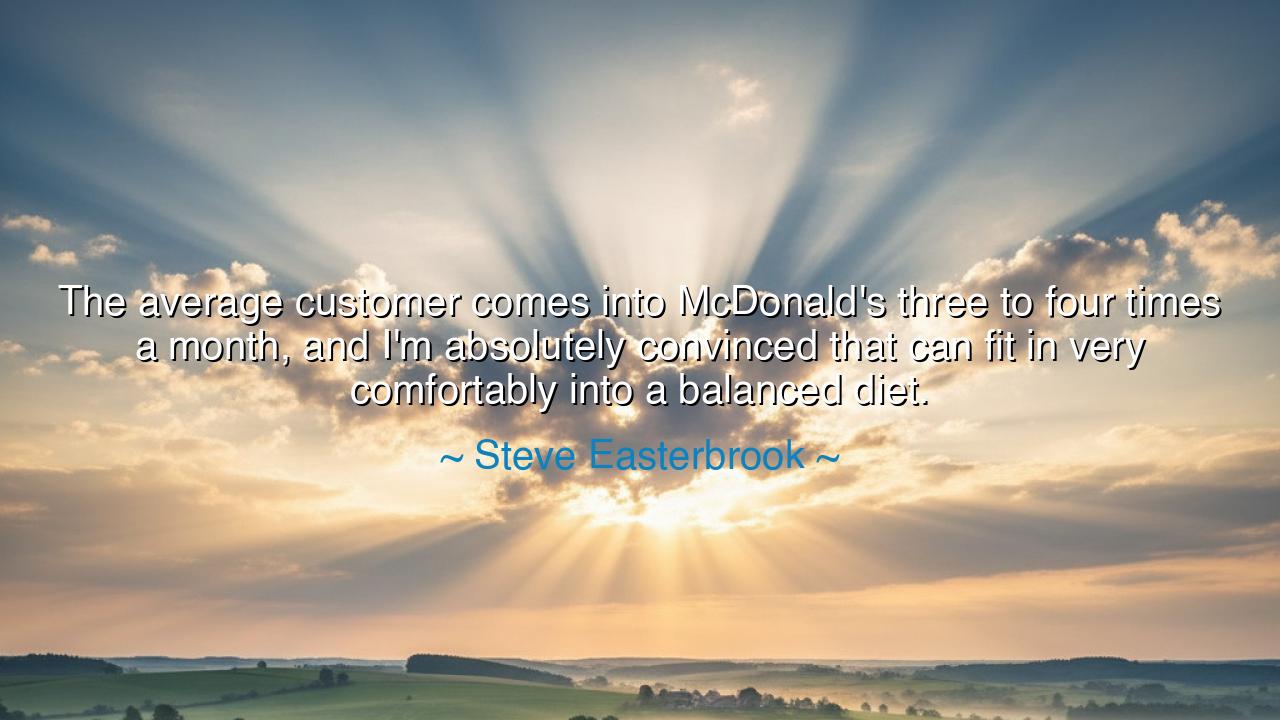
The average customer comes into McDonald's three to four times a
The average customer comes into McDonald's three to four times a month, and I'm absolutely convinced that can fit in very comfortably into a balanced diet.






In the words of Steve Easterbrook, “The average customer comes into McDonald’s three to four times a month, and I'm absolutely convinced that can fit in very comfortably into a balanced diet.” Though spoken in the language of modern commerce, these words conceal a wisdom older than any empire: the wisdom of balance, of moderation, and of understanding that excess—not pleasure—is the true enemy of health and harmony. Beneath their surface lies not a defense of indulgence, but a reminder that the path to well-being does not demand denial—it demands discernment.
For the ancients knew well that to live wisely is not to reject all delight, but to partake of it with awareness. In the temples of old Greece, carved upon stone, were the words of Apollo’s oracle at Delphi: “Nothing in excess.” This was the law of moderation, the golden mean, the balance between austerity and indulgence. Easterbrook’s belief that even a visit to McDonald’s can fit within a balanced diet is, in truth, an echo of this ancient creed. It speaks to the art of living not through extremes, but through harmony—where joy and discipline coexist as companions, not as rivals.
Consider the story of Cato the Elder, a Roman who was as disciplined as he was practical. He did not scorn pleasure, but he approached it with reason. “The wise man,” he once said, “does not live to eat, but eats to live.” Yet, when the time came for celebration, Cato did not fast in protest; he dined with gratitude, aware that pleasure, when taken with measure, renews the soul. Easterbrook’s reflection carries the same truth into our modern age: the problem is not the meal, but the mindset. A man who understands moderation can feast and still be healthy; one who knows only excess can starve amid abundance.
There is also in these words a lesson about perspective—about the way we divide the world into “good” and “bad,” when life itself teaches us that truth lies in proportion. To declare any food an eternal sin is to forget that nourishment is not only of the body but of the spirit. A shared meal, a familiar taste, the laughter that rises over a table—these too are part of balance, as vital to the heart as vitamins are to the flesh. The danger lies not in the golden arches, but in the absence of awareness. The wise do not curse the bread or praise the salad—they seek the wisdom to know when enough has been taken.
Moreover, Easterbrook’s statement reflects the spirit of adaptation, the same spirit that guided the ancients as they navigated change. For even in modern abundance, where food is swift and choice is endless, the human challenge remains unchanged: to live with moderation in the midst of plenty. The philosopher Epicurus, often misunderstood as a lover of excess, lived by the principle that pleasure was only true when it brought peace, not dependence. He ate simply, but he never despised enjoyment. He taught that one could drink wine or eat bread so long as the soul remained free. In the same way, Easterbrook’s message is not a hymn to indulgence—it is a call to conscious living in a world overflowing with temptation.
Let us then see his words as a parable for our own time: that balance is not found in rejection, but in rhythm. To eat wisely is to live wisely, to know the ebb and flow of the body’s needs, and to respect them without falling into obsession. Three or four visits a month—what are they but moments of choice, opportunities to practice awareness? Each meal becomes a mirror: it reflects not only what we consume, but who we are when we choose it.
So, my friends, take this teaching to heart: seek balance, not extremes. Let not guilt shadow your joy, nor indulgence dull your discipline. Eat what sustains both body and spirit, and remember that the measure of health is not in denial, but in harmony. As Steve Easterbrook reminds us, even the simplest pleasures, when approached with mindfulness, can dwell comfortably within the circle of well-being. For the key to life’s nourishment—whether of food, love, or purpose—has always been the same: to partake with gratitude, to enjoy with restraint, and to live in balance with all things.






AAdministratorAdministrator
Welcome, honored guests. Please leave a comment, we will respond soon